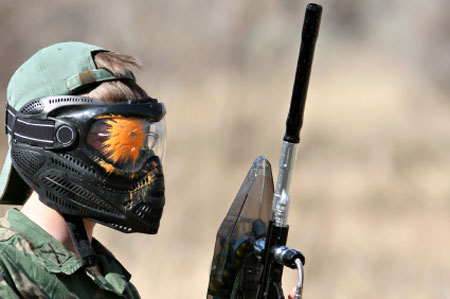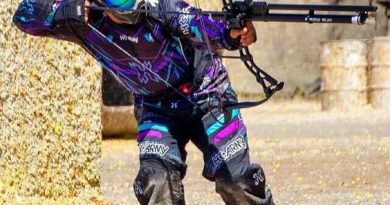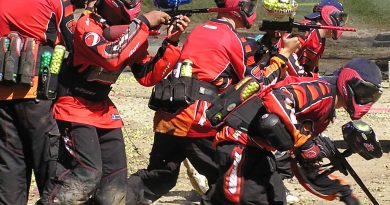Cheating in paintball
“So if a celebrity jumped off a bridge, would you do it too?”
I groaned. I was ten years old. I don’t remember what the argument was about, but it was a line my parents always were quick to use when the need arose. Chances are I wanted to do something that all my friends were doing, but my parents just didn’t agree.
Every kid growing up has probably heard this cursed statement hundreds of times. I’m a lot older now. My parents have not given me the piece of advice in years. Yet this commonly used phrase was the first thing to pop into my mind when I read over a particular thread on PBnation message boards.
Acting as an online nexus of activity, PBnation connects players from around the United States to discuss, argue, buy, sell, meet, and socialize, similar to Paintball Times, but not as tame. A lot of arguments on the webpage are the usual pointless, nonsensical drama that online message boards seem to attract like a magnet to iron shavings in a high school lab project. However, one can learn a great deal about what’s going on in the paintball world when reading over some of the threads.
The argument was in the forums for the famous pro-team and multi-title winner Dynasty. A thread was started on the relationship between Dynasty and Russian Legion. Personally, I don’t follow pro-ball too closely, but amid the tired arguments was a valid question that paintballers would rather defer than engage directly. What is cheating and what is its place in paintball?
Things had boiled down to fans of either team accusing the other of cheating. There was the usual plethora of here say and speculation about who did whatever. To us, the common baller, the affairs of these professional players, while entertaining, is not pertinent. What was quite relevant can be summed up by a few user responses:
“It’s a sad fact, all pro teams cheat.”
“Cheatings part of the game”
“All guns ramp, so who cares?”
There’s not much of an objective way to look at cheating. Surely the written law forbids any cheating of any kind, but the dry, mundane black and white text of the rulebook often has little power on the field. I argue that cheating has absolutely no place in paintball. The nature of the game makes it different from other sports, even other extreme sports. This uniqueness requires honest and integrity on the part of the players. I realize this attitude is not shared by all members of the community, but I hope to calmly and objectively approach three of the most common arguments in favor of cheating. Just remember that
Cheating, by definition, is to violate rules deliberately, as in a game
It’s the referee’s job to pull you. If I’m hit, I’m going to keep playing until they pull me out.
You’re running hard for your bunker. One of your back players got hit off the break and the other is trying to sweet spot the left lane. You see their mid players sliding into their bunkers and hear the shouts of your teammates. Your run has been too long and you force yourself to slide prematurely. Luckily, your close encounter with the dirt saved you. “Snake hot, snake hot!” yells your back player, barely audible above his fifteen ball per second stream. Two players have occupied your snake. You look up and see that you’re clear for the run. You bring your gun up, firing at the first guy and greeting his surprised gaze with a bright green splotch mark. At the same time, he instinctively pulled the trigger and put two purple globs on the front of your jersey. The refs are coming toward you as you keep running and bunker the opponent’s friend. You then glance down, pretending you were just shot at that moment, and walk to your deadbox.
Playing on is very common in both tournament and recreational paintball. One must understand that by the inherent speed and ferocity of paintball, some players will accidentally play on through hits. I have been hit by strings of balls that I barely felt because of the adrenaline surging through my system. However, the playing on that has been prevalent recently is intentional, deliberate, and even pre-planned.
Referees are people. Without some sort of super-precise machine that would automatically disable a gun after the player was hit like in laser tag, there is no real way to prevent playing on. The responsibility of honesty is up to the player. Players are running toward one another, shooting fast flying rounds of paint at each other. Even if a referee calls a player out while he is in motion, he often needs to physically run after the player to pull his armband off. By this time, the player has bunkered more people and chaos takes the field. Referees are swarming around the field and collecting armbands like kids at an Easter egg hunt, players are arguing, penalties are assessed. One player playing on can completely change the entire outcome of the game.
It is the job of the referee to pull players from the game, but it is an even larger responsibility of the player to call himself out. Paintball is played on the premise that if you are hit one time, you are eliminated from the game. If players don’t call themselves out, what exists now as an organized sport degenerates into a mindless shooting fest for hooligans.
Of course cheating is wrong in the rule book, but who plays by the rules? A holding penalty in football is against the rules, but its part of the game. Those who can cheat well have developed a skill just as important as snap shooting.
When the first paintball players took to the woods of New Hampshire, they were equipped not only with markers and tubes of paint but with respect. There were no referees, no video playback, and no point penalties. Paintball was forged from the very beginning as a game of honor. Today, familiar sports are being redefined. The National Hockey League season has been cancelled due to the inability of players and league representatives to compromise and the use of anabolic steroids is still a hot topic in the baseball scene.
The tournament paintball scene has made leaps and bounds in dramatically changing the face of paintball, from the introduction of X-Ball to the PSP 15 BPS fully automatic cap. Still, no Darwinian concept of evolution can justify cheating in the game. Just because competition level paintball promotes rapid action, aggressive playing style, and fast markers does not mean that players also have the right to cheat. It would be naivety in the extreme to say that there isn’t a prevalence of cheating in the professional leagues. From local tournaments to PSP events, players cheat their way to victory. Some players feel that they must cheat “by necessity”, creating a sort of cheating arms race. Entire guides on how to cheat against chronograph and field referees have been drafted with revisions and positive input from around the world. This does not make it right, because unlike soccer or football where rules can be bent, paintball is quite literally a whole new ball game.
One important aspect of paintball is bad luck. No matter how skilled the player, a ball could randomly slam into your body and explode at any time. Perhaps it was friendly fire.




